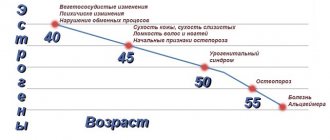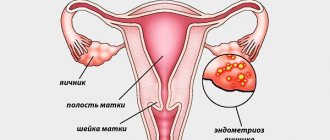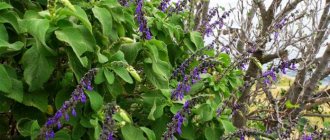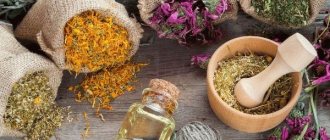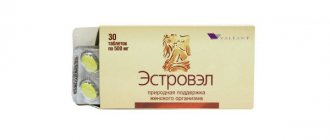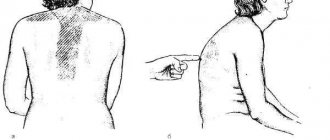Hello, dear readers!
Today’s publication concerns only women, and we will discuss herbs for menopause.
In the life of every woman there comes a period, a new stage, which is sometimes called autumn. (And translated from Greek, menopause is a step).
Often the condition at this time is associated with hot flashes, sleep disturbances, headaches, high blood pressure, irritability, and loss of strength.
But there is no reason to panic, you just need to pay more attention to your beloved. And medicinal herbs will help you with this. You will learn what herbs to drink during menopause from this article.
Herbal medicine for menopause
A special favorite of folk healers and homeopaths are herbs with plant estrogens for menopause.
Phytoestrogens are non-steroidal substances that are similar in structure to estradiol, but are not hormones. They are found in high concentrations in soybeans, lentils, rice, wheat, barley, oats, flax seeds, tea and many herbs that we usually do not eat (cohosh, clover, alfalfa and others).
In gynecology, preparations based on phytoestrogens are used for non-hormonal treatment of diseases of the reproductive organs, menstrual dysfunction and menopausal syndrome.
The need for the use of phytoestrogens is increasing due to the presence of contraindications to hormone replacement therapy (HRT) in women.
Replacing missing natural hormones with synthetic ones is a proven clinical method for treating estrogen deficiency during menopause. However, HRT cannot be used for cancer, a tendency to thrombosis, diabetes mellitus, liver and kidney diseases, as well as vaginal bleeding of unknown etiology.
Phytoestrogens are not able to replenish the level of real estrogens and completely replace them, but they can perform some of their functions.
The benefits of herbs during menopause
Herbs that replace female hormones, normalize the cardiovascular system and metabolism, calm the nervous system and replenish the vitamins and minerals missing in the bones can be beneficial during menopause.
The main task and features of the therapeutic effect of herbs and plant extracts depend on the stage of menopause:
- During the premenopausal period, the action of herbal remedies is aimed at alleviating hot flashes and sweat, due to the equalization of hormonal levels. Since menstruation still continues during this period and there is a possibility of becoming pregnant, you should give preference to components that are not contraindicated in early pregnancy or monitor contraception. This is important because the symptoms of pregnancy in adulthood can easily be confused with symptoms of menopause.
- Menopause means the complete cessation of menstruation and estrogen production. At this stage, the symptoms of menopause appear more pronounced, so you need herbs that will help cope with intense hot flashes, headaches, mood lability, rapid heartbeat and surges in blood pressure. Also, if you have not previously been involved in the prevention of osteoporosis and cardiovascular diseases, menopause is a good time to do so.
- Postmenopause is a stage of adaptation to hormonal changes. During this time, many women experience hot flashes and mood instability. However, this does not happen for everyone. Metabolic problems, as well as pathologies of the thyroid gland and adrenal glands, can complicate the postmenopausal period. It is no longer possible to get by with home recipes for such complications, so together with your doctor you need to choose the treatment that suits you. If postmenopause goes smoothly, then herbs that strengthen blood vessels, bones and the immune system will be good helpers. As well as means that normalize the functioning of the central nervous system, heart and metabolic processes.
Below we will look at individual herbs that have good reviews in the treatment of menopausal syndrome and options for their use. We will also separately consider what contraindications are possible for the use of individual herbal components.
This information is for informational purposes only. Be sure to contact your gynecologist for advice on treating specific menopausal symptoms.
Duration of menopause and its stages
The entire process of changing the function of the female body takes about 10-15 years. After all metamorphoses are completed, the woman ages. Such a long-term and gradual change consists of several stages:
- Premenopause. Begins after about 45 years of age. The menstrual cycle begins to change, and signs of irreversible aging appear. It is necessary to consult a doctor to prescribe sedatives in order to avoid psychological disorders. This period lasts about 3-4 years, during which time a woman can still become pregnant and carry a child.
- Menopause. It occurs at the age of 48-50 years immediately after the end of the last menstruation and lasts about a year. A consultation with a gynecologist is necessary to get tested for the level of the FSH hormone. A high level of it in the blood means the onset of menopause.
- Postmenopause. There is a complete stop in the production of sex hormones, the ovaries decrease in size. During this period, the most pronounced symptoms of menopause appear. Most women have a hard time with this stage and require therapeutic or preventive therapy.
Sage
Sage during menopause is useful for its tonic effect and ability to reduce the activity of the sweat glands. Thus, this medicinal herb is a good assistant in the treatment of excessive sweating during hot flashes. The plant also has the ability to eliminate weakness, dizziness, anxiety and depressive mood.
You can take sage during menopause and hot flashes in the form of tea, tincture or decoction. To prepare, you need to pour fresh sage leaves (5-6 pieces) with a glass of boiled water and cook in a water bath for 5 minutes. This decoction can be drunk as tea with the addition of honey to improve the taste.
Recommendations for admission
There are some recommendations regarding the use of phytoestrogens . For example, decoction and tea with medicinal herbs should be prepared in a steam or water bath. It is prohibited to take such medications during menstruation and during pregnancy. Before you start using herbs, you must donate blood for hormones. Before taking them, you should familiarize yourself with the contraindications.
Plants should not be taken simultaneously with hormonal medications. You should not expect an immediate effect from treatment. During therapy, it is necessary to observe the stages of the menstrual cycle. When creating a tincture, it is better to use alcohol rather than vodka. It is better to brew herbs containing hormones with hot water, the temperature of which does not exceed 80 °C, rather than with boiling water.
Sources:
https://xn--45-6lcpl1f.xn--p1ai/history/view/74-travi_pri_klimakse_pomogi_sebe_sama/ https://gormonal.ru/estrogeny/pri_klimakse https://mesyachnye.expert/travy/polza-trav-soderzhashhih -zhenskie-gormony-jestrogeny
Flax seeds
Phytoestrogens contained in flax seeds help reduce the intensity of hot flashes, eliminate excessive sweating, vaginal dryness and normalize skin condition during menopause. Flax seeds also contain a lot of Omega-3, so they have a strengthening effect on the cardiovascular system, help replenish vitamin deficiencies and improve digestion.
Flax can be used to prepare a healing infusion. The crushed seeds should be poured with water (500 ml per 25 g of mass), brought to a boil and simmered over low heat for about 10 minutes. The resulting mixture should be infused for 24 hours, then it can be taken 100 ml twice a day before meals.
However, not everyone will like the method described above, because the decoction has a very specific taste.
An alternative to this method is to consume flax seeds with food, adding them to salads or homemade smoothies.
Where can I buy
You can purchase everything you need to normalize a woman’s condition during menopause at the Russian Roots store. The order will be delivered as soon as possible to any address in Moscow and the Moscow region by courier service, in Russia - by mail. You can also easily buy herbs and beekeeping products at any herbal pharmacy in Moscow.
Attention! All materials published on our website are protected by copyright. When re-publishing, attribution and a link to the original source are required.
Red clover
The use of red clover during menopause enjoys good reviews due to the phytoestrogenic properties of this herb, as well as the content of B vitamins, calcium, zinc, iron and phosphorus. The beneficial substances contained in the plant have a beneficial effect on the heart, vascular walls, metabolic processes and bone density. They also help fight atrophic processes in the genitourinary system, hot flashes, sleep disorders and libido.
Anti-menopausal homeopathic preparations are created based on the herbal extract of red clover. At home, the plant is used to make tea and infusions. Dry herbs are poured with hot water or boiled to a boil, and then infused for about half an hour. The decoction is taken three times a day before meals for 2–4 weeks.
Hop cones
Hop fruits are widely used in homeopathic and folk remedies for the treatment of painful menopause.
The plant extract has a beneficial effect on the functions of the central nervous system, which helps normalize the general well-being of women who suffer from hot flashes and sweat a lot.
Sedative and analgesic effects eliminate problems with insomnia, headaches and anxiety attacks caused by psycho-emotional disorders in adulthood. Thiamine and vitamin A contained in hops are irreplaceable helpers in the fight against depression, despondency and external manifestations of aging in the female body.
It is not difficult to prepare an infusion at home. 100 g of inflorescences are poured into 0.5 liters of vodka and allowed to brew without exposure to sunlight for 7–8 days. Then the tincture is filtered and taken 5-6 drops, diluted with water, twice a day.
Hops can be purchased in pharmacies. It is sold in filter bags for brewing tea.
general characteristics
Hormones are biologically active substances that have different structures and compositions. In the female body they are synthesized mainly by the endocrine glands. They are produced by the hypothalamic-pituitary system, thyroid gland, ovaries and other organs.
In the female body, these substances are interconnected. When the level of some hormones increases, the activity of others decreases - and vice versa. Penetrating into the blood, they spread throughout the body. These organic compounds affect specific target cells. It is thanks to this that their main functions are ensured.
There are more than 60 different hormones present in the human body, only some of which are female. But such a division is formal, since they are also produced in men, but in different quantities. Female hormones include:
Testosterone, which is synthesized by the adrenal glands. Despite the fact that it is considered to be a male hormone, it is important for the female body. In small quantities, testosterone is responsible for endurance, physical strength, libido and bone strength.
- Thyroxine. It is synthesized by the thyroid gland. The hormone affects all metabolic processes.
- Estrogen produced by the ovaries. It affects the formation of the figure and ensures the normal functioning of the reproductive system.
- Progesterone, which promotes conception. It also ensures the correct course of pregnancy and is involved in other equally important processes in the body.
- Insulin produced by the pancreas affects carbohydrate metabolism.
- Oxytocin produced by the hypothalamus. This substance promotes labor and forms the maternal instinct.
Hog queen
The boron uterus contains substances similar in structure to natural estrogen and progesterone. Due to the content of important plant hormones, this herb is included in many homeopathic remedies for the treatment of menstrual irregularities, the prevention of endometrial growth, inflammation of the fallopian tubes and the treatment of severe menopausal syndrome.
During menopause, the herbal collection of boron uterus restores the nervous system, normalizes blood pressure, balances hormonal levels and improves the functioning of the cardiovascular system.
Dried herb can be easily purchased at a pharmacy. Also on sale are ready-made infusions and teas based on boron uterus. It’s not difficult to prepare a decoction at home: 2 tbsp. l. dried herb, you need 1 liter of boiling water, then the resulting mixture should be boiled for no more than 5 minutes over low heat. Take 32-3 times a day before meals.
Folk remedies to relieve symptoms of menopause, hot flashes, sweating
Most of the ailments during menopause are associated with 2 reasons: large-scale hormonal imbalance and increased nervousness. Therefore, measures are being taken in both directions.
To partially replace estrogen, herbal teas containing phytoestrogens and an increase in the diet of foods containing hormone analogues are used. These include:
- linseed oil;
- soy;
- walnuts;
- dried apricots;
- sprouted alfalfa seeds;
- strawberry;
- black beans;
- garlic;
- olive oil.
You should exclude smoked, spicy, salty foods, alcohol, coffee, and strong tea from the menu. They inhibit metabolism, act as a stimulant, further destabilize the nervous system, and cause swelling.
In order to save strength and channel the energy given by herbal remedies in a positive direction, it will be useful to review your daily routine and allocate more time for relaxation and pleasant walks. But you shouldn’t give up physical activity in favor of lying on the couch. This will completely reduce your vitality and minimize all previous efforts. To look great, sleep soundly, be in a good mood and smile at others, you need to find something you like, try to master meditative practices, find time for walking or visiting the pool.
Massage sessions with aromatic oil compositions, bath procedures at a gentle temperature, and yoga classes provide good support for the body during menopause. An integrated approach will help you survive menopause, reducing its manifestations to a minimum and not resorting to potent medications, limiting yourself to long-proven folk remedies.
Calendula
Calendula is a useful medicinal plant with anti-inflammatory, antiseptic and soothing properties.
Calendula extract is included in many homeopathic remedies for the treatment of gynecological disorders and relief of menopause.
The use of calendula-based products will help normalize the functioning of the nervous system and reduce the frequency and intensity of hot flashes.
In the preparation of homemade infusions, the flowers of the plant are used, which are infused with alcohol for 2 weeks. The product should be taken by diluting a teaspoon of infusion in a glass of drinking water.
Dill seeds
Dill seeds during menopause are effective in combating vegetative symptoms such as hot flashes, dizziness, migraines, rapid heartbeat, anxiety and panic attacks. And also the substances contained in the plant help relieve swelling and inflammation from the joints and have an analgesic effect.
Women experiencing menopause take dill water to improve overall well-being and relieve menopausal symptoms.
You can prepare dill water by adding 6 tbsp. l. seeds with a liter of boiling water. Next, the product must be infused for 20–30 minutes and filtered. Drink the infusion three times a day, ½ glass, for one month.
Hawthorn
Hawthorn has tonic, anti-inflammatory and mild sedative properties. The extract is used to normalize the functioning of the cardiovascular system, strengthen blood vessels, and treat neuroses and insomnia.
Teas, decoctions and infusions are prepared from the fruits and flowers of hawthorn. Plant raw materials can be purchased in filter bags for brewing tea, or you can prepare the product at home: pour 50 g of fruit into 0.5 liters of boiling water and leave for about an hour. Drink 100–150 g of tincture 3 times a day, the course of treatment is no more than 1.5 months.
Hawthorn can be taken alone, or combined with chamomile and motherwort, which will enhance the sedative effect.
Oregano
Oregano herb helps with the symptoms of hot flashes and sweating during menopause, and also normalizes sleep and has a calming effect on the nervous system.
Herbal infusions of oregano, mint and chamomile have anti-inflammatory and antispasmodic effects. The phytohormonal parameters of the herb are quite low, but with regular use it can improve overall well-being during menopause.
Dried herbs can be purchased at a pharmacy or collected yourself. To prepare the infusion, you will need 50 g of dried leaves, stems or flowers per 300 ml of boiling water. The mixture is infused for 4 hours, then filtered and drunk 3 times a day half an hour before meals.
Nature's Answer
This product contains medicinal plants from China, North America, Central Europe and the Mediterranean. Herbal collection includes raspberries, angelica, Abraham tree, black cohosh.
The collection is used as a tonic, it improves blood circulation, helps relieve menstrual cramps, restores hormonal balance, and reduces irritability. Female Complex fights hot flashes during menopause and also helps overcome insomnia.
The herbs are packaged in soluble capsules for easier use. Take 2 pcs. in a day. One capsule contains 400 mg of herbal mixture. It is recommended to take the drug during meals or with plenty of water.
Female Complex is contraindicated for use when planning medical procedures for various diseases of the reproductive system.
Rose hip
The fruits, leaves and flowers of rose hips have long been used in medicinal and cosmetic products. The plant is rich in vitamins B, E, P, alpha and beta carotenes, as well as trace elements of calcium, magnesium, zinc, phosphorus and iron. Such components gave rose hips anti-inflammatory, bactericidal and restorative properties. It accelerates tissue regeneration, strengthens the walls of blood vessels, stops bleeding and accelerates metabolic processes.
The positive effects on the functions of the cardiovascular and nervous systems make rose hips especially useful during menopause.
Decoctions and infusions of rose hips are prepared in a ratio of 100 ml per 5 g of raw material. Healing remedies can also be prepared from crushed rosehip roots and leaves. The resulting decoction is drunk as tea 2-3 times a day. Rosehip oil can be purchased at a pharmacy. It is used to treat problem skin and slow down the aging process.
Contraindications to herbal medicine
All of the above herbs and plant fruits can bring not only benefits, but also harm to health. Therefore, before taking them, pay attention to possible contraindications:
- Flax seeds are contraindicated for gastrointestinal diseases, pancreatitis, liver cirrhosis, hepatitis, cholecystitis, cysts and uterine polyps.
- Sage is also contraindicated during pregnancy and lactation. The herb should not be taken if you have endometriosis, hypertension, diabetes, kidney disease, thyroid pathology and cancer. The side effects of sage often affect the mucous membranes, increasing their dryness and increasing the risk of inflammatory processes.
- The hormonal properties of red clover during menopause are contraindicated in women with circulatory disorders, tumors, heart disease, a history of heart attacks, varicose veins and thrombosis.
- Hop cones have a strong diuretic effect, so it should not be taken if you have kidney or bladder diseases unless advised by a doctor. The drug is contraindicated for endometriosis and cancer. May increase swelling and weight gain.
- Borovaya uterus is contraindicated in case of poor blood clotting, ulcers and gastritis. Abdominal pain after starting to take infusions with boron uterus is a common phenomenon and requires mandatory consultation with a doctor.
- You should not treat menopause with calendula infusions for gastritis, stomach ulcers and cholecystitis. A possible side effect from taking infusions may be abdominal pain, bitterness in the mouth, burning in the esophagus, as well as allergic reactions.
- Dill seeds are contraindicated for people with low blood pressure and those suffering from cholelithiasis. Dill has a diuretic effect, so it should be used with caution for diseases of the genitourinary system.
- Hawthorn increases blood clotting, so it is contraindicated for thrombophilia (excessive clotting). It is also not recommended to take a remedy with hawthorn for low blood pressure, bradycardia and liver disease. The plant cannot be used for medicinal purposes during pregnancy and lactation.
- Treatment with oregano during menopause is contraindicated for women with stomach ulcers, gastritis, cholelithiasis, hepatitis, hypertension and heart defects.
- Rosehip is not recommended for people with gastrointestinal diseases and low blood pressure. The plant is contraindicated for asthmatics, as well as people with high blood clotting, diabetes mellitus and a tendency to thrombosis.
You can find out which herbs you can use and which you can’t by contacting a qualified doctor for a comprehensive examination. You should not self-medicate and prescribe herbal remedies or homemade infusions yourself.
In addition to contraindications, there is a risk of allergies and side effects. Any treatment and even prevention will go smoother if the attending physician is aware of the treatment method and can check its effect on your body.
Herbal medicine for menopause is effectively used in both official and folk medicine.
Herbs are included in many homeopathic remedies for treating menopausal symptoms. Many women prefer drugs made at home to pharmaceutical drugs. Such ladies need to be careful and be sure to discuss contraindications, side effects and individual dosage of herbal remedies with their doctor. The reward for a responsible and careful attitude towards your own health will be a reduction in ailments due to menopause, and the opportunity to prolong youth and well-being for many years.
Progesterone stabilization
For such purposes, Rehmannia and Crescentus are used. These plants have an effect on the pituitary gland, leading to an increase in the production of this steroid hormone. The herb Vitex has similar properties, which is preferably taken in the second phase of the menstrual cycle. Thus, it will be possible to normalize the synthesis of progesterone. These hormonal plants support signaling pathways in cells, increasing the effectiveness of sex hormones.
If you need to increase progesterone production, then you should pay attention to thyme and wormwood. Such herbs improve the production of not only this hormone, but also estrogen. But yarrow, mantle and hibiscus can imitate its effect.
